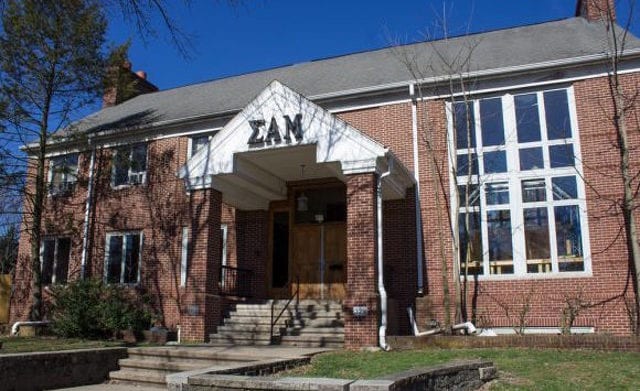Two fraternity houses that continued operating despite the groups’ loss of Penn State recognition were not in violation of State College Borough’s zoning ordinance, a state appeals court ruled this week.
Both Sigma Alpha Mu, 329 E. Prospect Ave., and Alpha Chi Rho, 425 Locust Lane, had their university recognition suspended in 2017 but continued operating as fraternity houses in the R-2 zoning district. The borough and Centre Region Code Administration informed both property owners that they were in violation of State College’s ordinance, which was amended in 2010 to require an occupying fraternity or sorority to have university recognition to operate as a fraternity house.
The State College Zoning Hearing Board denied appeals by the property owners, concluding that when the fraternities lost recognition, they lost their claims to operate fraternity houses.
That decision was overturned in 2018 by Centre County Court of Common Pleas Judge Katie Oliver, who ruled that both were lawful nonconforming uses because the properties existed as fraternity houses prior to the 2010 amendment requiring university recognition. Fraternity houses were not defined in the borough zoning ordinance until 1980 and then it had the less restrictive requirement that the resident organization be ‘affiliated’ with the university.
Pennsylvania Commonwealth Court upheld Oliver’s decisions on Thursday.
‘Since the property had been used as a fraternity house long before the borough adopted the more restrictive 2010 definition of ‘Fraternity House,’ use of the property as a fraternity house is a lawful nonconforming use that landowner is entitled to continue,’ Judge Patricia McCullough wrote in the Alpha Chi Rho decision. ‘While we understand the borough’s desire to protect the residential characteristics of the neighborhoods where fraternities are located, such public policy concerns do not authorize the borough to compel a change in the nature of an existing lawful use of the property.’
McCullough issued a similar opinion in the Sigma Alpha Mu case.
Alpha Chi Rho has had a fraternity house at 425 Locust Lane since 1922, long before even the R-2 zoning district was adopted in 1959.
The Prospect Avenue property was built as fraternity house after a special exception was granted in 1989, and Sigma Alpha Mu has occupied it since 1998.
Oliver and McCullough also both found that no evidence was presented as to when or how either fraternity was ever formally recognized by the university.
State College can still appeal McCullough’s ruling to Pennsylvania Supreme Court.
Penn State officials have openly supported the borough’s ordinance and ability to prevent suspended fraternities from operating fraternity houses. In a January op-ed for PennLive, Penn State President Eric Barron expressed concern about Oliver’s 2018 ruling.
‘This would impede any ability to promote student and community safety,’ Barron wrote. ‘This is an example in which some unrecognized student organizations are operating independently of the university, and in some cases national fraternity organizations are sustaining charters under these circumstances — it is questionable and troubling judgment as well as potentially dangerous.’
Barron called Sigma Alpha Mu and another fraternity, Alpha Sigma Phi, ‘rogue chapters,’ about which the university warned students and parents.
Sigma Alpha Mu’s Penn State chapter was suspended by the university for two years starting in April 2017 for numerous violations of alcohol restrictions imposed on all Greek life organizations after the death of sophomore Timothy Piazza two months earlier following an initiation event at the now-banned Beta Theta Pi fraternity.
This September the national Sigma Alpha Mu revoked the Penn State chapter’s charter after the university notified it ‘of continuing behavioral issues at the chapter house that jeopardized the welfare of the community.’
Penn State noted at the time, however, that despite the loss of university recognition and revocation of the charter, the members continued to live in the house under a private lease.
Alpha Chi Rho was suspended for one year in July 2017 for hazing. Three months later the fraternity was charged with furnishing alcohol to minors and in April 2018, the national organization announced it was closing its Penn State chapter.
The Commonwealth Court ruling could add another wrinkle to State College’s ongoing comprehensive zoning rewrite.
Most of the 42 fraternity houses in State College are located within the R-2 district, which as of now, no longer permits fraternity houses. While the existing ordinance allows for a house of a suspended or closed fraternity to be leased to a recognized fraternity or sorority, once it stops operating as a permitted fraternity house it can never again operate as one in the R-2 district.
Some discussion has focused on what former fraternity houses can be converted to. The current ordinance allows for conversion to a club or community center, day care center, home for the elderly, nursing home or private school, in addition to single-family homes.
With the court rulings, the borough may also look to change how it defines fraternity houses.



